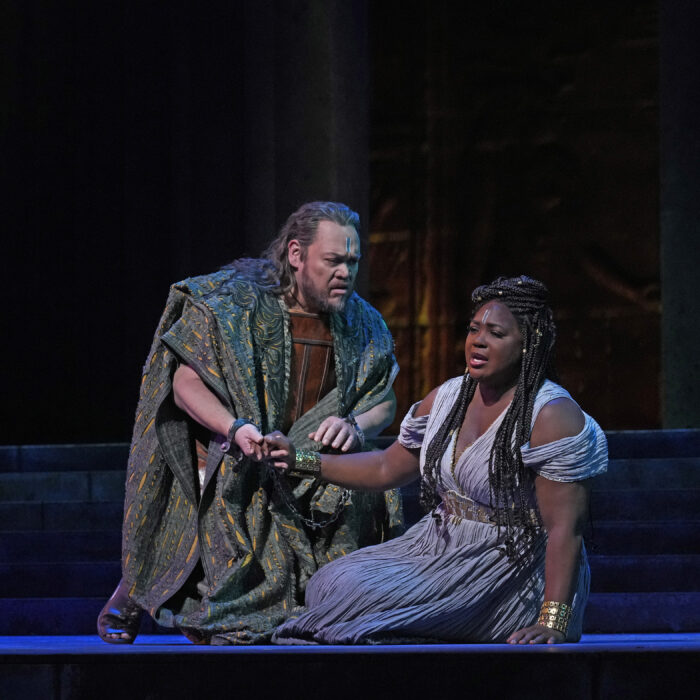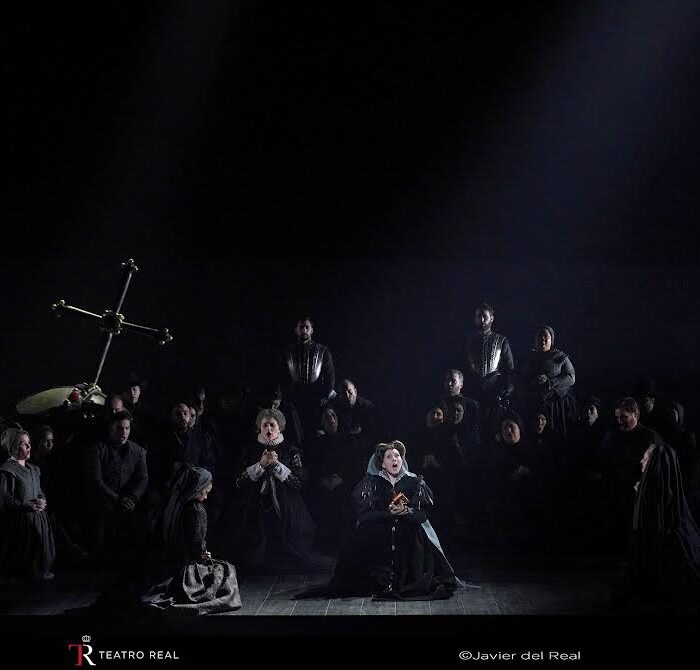
Cal Performances 2024 Review: Asmik Grigorian & Lukas Geniušas in Recital
By Lois SilversteinAsmik Grigorian performed in the U.S. with her first performance in New York at Carnegie Hall, then a performance in Berkeley at Hertz Hall. These are her only two performances in the U.S., which makes them remarkable and exciting. The Lithuanian’s reputation proceeds her in so many ways and she did not disappoint. The performances also included Lukas Geniušas, the Russian-Lithuanian pianist. Together they made time on stage fly by.
The program included music by Tchaikovsky and Rachmaninoff. The experience was outstanding. The two artists appeared onstage, Genušias in a black embroidered shirt, and Grigorian in a dramatic and austere black tuxedo which included patent-leather high-heeled platform shoes. Their performance was polished and professional.
Musical Highlights
The pair was musically in sync like a unit, left hand and right, although each performed fully within their own “field.” Genušias played four solo pieces, Tchaikovsky’s Romance in F Minor, Op. 5 and Scherzo humoristique, Op. 19, No. 2. Grigorian sang fourteen pieces, including six Tchaikovsky, and eight Rachmaninoff. She also added one for an encore. Altogether the performances were thorough, romantic, and mesmerizing. The music was drawn from the romance-driven 19th century, rich with pleading, yearning, and aspiring. Melodic and opulent, replete with the sufferings of love, the yearning and painful longings that drive a lover to the far reaches of their heart and soul.
They opened with Tchaikovsky and one melodic line after another led the audience across the heart’s geography. Grigorian’s control over her rich and lustrous voice aimed right at our vulnerabilities. “Amid the din of the ball” Op. 38, No 3, gave us at once full-bodied depth and delicate pianissimi. Every note flowed seamlessly to another. “None but the Lonely Heart,” Op.6, No.6, made it clear that she was committed to every note, the well-known Tchaikovsky melancholic expression of longing and loss, quickly emerging from the far-away and the familiar. She reminded us of the love of once-upon-a-time, remembered and longed for again, even now. We knew this but none of it sank into the maudlin. In “A tear trembles,” Op. 6, No. 4, she mingled light and dark sound with a Chopinesque lyricism, the plaintiveness taking us into her version of another world – distant and private.
Genuisas played two solos, following these first songs, Tchaikovsky’s Romance in F Minor, Op. 5, and Scherzo humoristique, Op. 19, No. 2, extending the contemplative and bittersweet story artfully unfolding on stage. Beyond this, the rhythmic variety he articulated brought us into the ethnic texture of the music as well as his own pianistic virtuosity. His playing was exact and delicate, in command of a small but intense circuit with a moving depth of richness and texture. Echoes of Rubenstein and the bell-like tones of a far away Russian landscape bridged the old world with that of the two energetic younger people before us. Clearly Geniušas is a solo pianist who brought an extensive part of his musical vocabulary.
Grigorian picked up from here and proceeded with a stunning “I bless you forests,” Op. 47, No 5, her low register fully present and embracing with the words, “Oh, if I could only merge all of life and my soul with all of you,” bringing us to the heart of this part of the performance, the Alexsey Tolstoy’s lyrics encompassing so much of all she was singing about. The last Tchaikovsky rounded off the section, Grigorian singing as if she were talking to us, telling us how it is, how things were as she, the narrator, saw and felt them. Again the lower register dug out emotion with feeling and clear articulation. The combination of depth and a colloquial feel created an intimacy that made for an unusual lyrical coupling. The two showed how they wanted to be there, showing, delineating what they knew and what they believed. There was no gap.
More Illuminating Details
Rachmaninoff was showcased, following the intermission, and listeners ventured into the Russian pianist and composer’s earthy and ethereal landscape. So much color came from Grigorian’s voice as she traveled so many intriguing lanes – “In the silence of the secret night,” the text by Alfanasy Fet, enabled us to peer into a much private place we aren’t often allowed, another’s own heart-scape. Seductive and satisfying but without voyeurism, Grigorian sang and Geniušas played with controlled abandon. This, this is what we have, we are, “in rapture against all reason”.
The next two songs opened up another byway, a sense of possibility and blooming, Grigorian created a sense of mystery as if she had a secret understanding and was there to present it, life and love, both hot and cool. Clearly, she was at home while performing these pieces. She was confident and her voice sounded full, and vibrant. The top of her register was majestic. Her vocal flexibility astonished, along with her clear-eyed insistence of what was being said. Poetry all around, from the depths of somewhere far beyond.
Geniušas’s solo Preludes with their big chords and an excursion into the upper register gave us more of the Russian overtones that we associate with Rachmaninoff and that landscape. He displayed a uniquely human and other-worldly mastery. In addition, it felt orchestral.
The last segment of the recital introduced even more jewel-like control of the intense lyricism. Pearls were the words, high notes at once full-bodied, and light, beguiling in the range without strenuous stretch or reach. Dissonance seemed hardly so. We were able to accept the bite without pain or awkwardness. Here was a new world, perhaps, with ardor and without pressing us into the ground. How did she do it? How did he accompany her while being fully present and unobtrusive at the same time? It was as if the two of them came across from such distant parts and spread their wares without a pinch. We were grateful and enriched by it all. Their single encore was was Rachmaninoff’s “Ne ver’ mne drug “(Do not believe me, my friend). Blood red flowers in addition to white were a fitting farewell.


